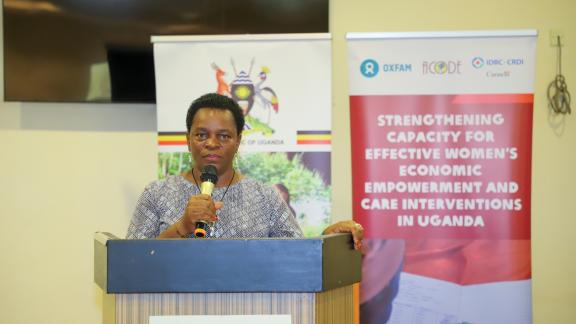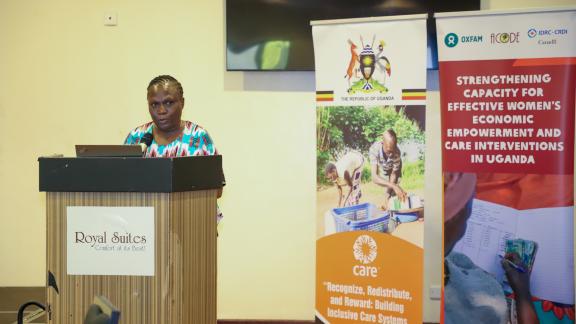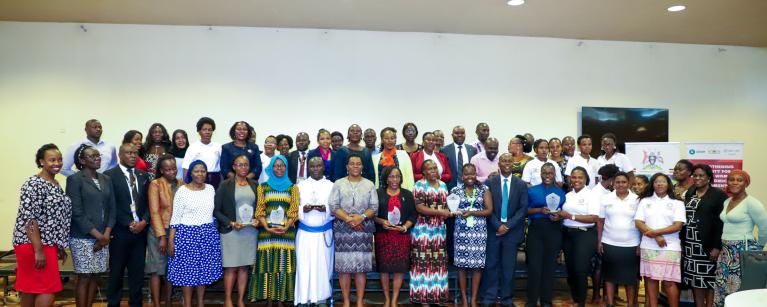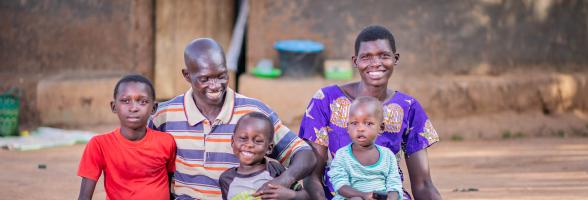In June 2023, the United Nations declared 29th October the International Day of Care and Support to emphasize the critical role of care work in achieving gender equality and building sustainable societies.
Oxfam in Uganda joined the Ministry of Gender, Labour, and Social Development (MGLSD) on October 29th to commemorate the second anniversary of the Day of Care and Support in Kampala.
The event was celebrated under the theme Transforming Care Systems to Achieve the SDGs in the context of Beijing +30" and brought together CSOs, government and private sector representatives.
Speaking at the event, Hon. Peace Regis Mutuuzo, the state minister at the MGLSD, called for male engagement in advocating for the reduction of the Unpaid Care Workload, which falls disproportionately on women.
"We need to nurture young boys and men in our homes and teach them to do productive work and share roles in a home. This will ensure that women are also able to get time to do more productive work,” she said.

Hon Peace Regis Mutuuzo speaking at the day of Care and Support celebrations in Kampala
Mutuuzo also spoke about the need to integrate planning for care work in government budgets to reduce the roles and responsibilities of women.
Representing Francis Shanty Odokorach, the Oxfam in Uganda’s country director, Jane Ocaya-Irama, the Oxfam in Uganda Women’s Rights advisor, appreciated the MGLSD and civil society partners who continue to work on addressing unpaid care work.
"I would like to convey deep appreciation to the Ministry of Gender, Labour and Social Development, through which our strategic partnership has led to the convening of this very important day preceded by several interventions on the care economy over the years."

Oxfam in Uganda Women's Rights Advisor Jane Ocaya-Irama delivered remarks on behalf of the Oxfam Country at the celebration of the day of care and support
Odokorach also highlighted the gains made through Oxfam’s collaboration over the last decade with partners like the Uganda Women’s Network (UWONET) and the Advocates Coalition for Development and Environment (ACODE)under the flagship multi-country WE-Care program and the Strengthening Capacity for Effective WEE And Care Solutions in Uganda programme.
Through these initiatives, Oxfam and partners have sought to address care work by enhancing the capacities of WEE and Care actors, including developing a WEE and Care Community of Practice and supporting a "WEE and Care Help Desk." They have also advocated for the recognition, reduction, and redistribution of Care work and the representation of carers.
Although Uganda is committed to several regional and global agreements that aim to advance gender equality and equity, research conducted by the Economic Policy Research Centre (EPRC), indicates that women in Uganda provide up to 20 hours per week of unpaid care work—twice as much time as men and boys.
“The persistent gender gap across socio-economic and political spheres, compounded by harmful social norms and insufficient resources, continues to weigh heavily on women and girls.” Said Odokorach, who reiterated Oxfam’s commitment to gender transformation through addressing the care economy.
Ms Grace Bulenzi Bulere, who represented the UN Women's Country Representative, commended the care workers and key stakeholders and called for continued advocacy to reduce the burden of care work.
“We want to ensure that by 2030, there will be progress to show for the work we’ve been doing in reducing the care work burden,” she said.
Among the key takeaways from the event was the need to create and ensure the affordability of technologies that reduce the burden of work on women to allow them to dedicate their time to more productive work.

